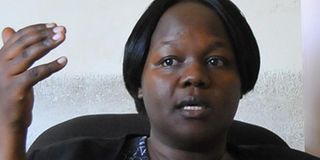Women decry discrimination in ICT policy initiatives

Ms Irene Murungi, the Women of Uganda Network Gender Policy Officer adressing the journalists during their press conference.Photo by Joseph Kiggundu
Kampala
As Uganda joins the rest of the world to launch the Women’s Rights Online Research, government has been urged to implement the laws that support online gender equality.
Irene Murungi the Women of Uganda Network (WOUGNET) Gender Policy Officer, notes that as Uganda joins other countries in launching this research today, it’s important to get more Ugandan women involved in Internet policy debates.
“WOUGNET envisions a society where women enjoy equal Internet access and rights. Our country is surrounded by opportunities for information and communications technologies (ICTs) to address challenges of sustainable development at all levels,” said Ms Murungi, adding that women must be at the heart of this process.
“Unfortunately, this is yet to happen and this often sidelines women from ICT policy and initiatives,” she added.
Addressing the media Ms Murungi noted that they are working hard to get the issue of online gender equality onto the government’s priority agenda.
“When we fight for this, a number of questions are raised: Why focus on women and technology when only 18% of the population can access internet and so many Ugandans are living in poverty?”
Experts intimate however that these questions miss the bigger picture. “When women get online, they can learn about their rights and how to report violence,” said the WOUGNET Coordinator, Dr Dorothy Okello.
She further noted that with such skills, women are exposed to more opportunities to compete in businesses, jobs and learning to improve their livelihoods.
“This is why we cannot wait to ensure possibilities offered by the Internet available to all women,” she added, further arguing, “ The campaign must be an integral part of the roadmap to gender inclusive sustainable development.”
In Uganda, however such mission faces a number of challenges including getting women connected in a predominantly rural country with a low average income, providing women with the skills to access the Web, when the female literacy rate stand at only 71.3%.
Given the gender inequalities in income, education and perceptions about women’s right to use the Internet, are obstacles to women’s access to and use of ICTs.
Murungi continued that, “We cannot be ignored, we must be brought into policy discussions to make sure gender inequality is not exacerbated by a lack of Internet access.”
Most critical changes in policy direction needed are a guarantee of freedom of expression and association and laws that ensure a safe space for discussion.
The ICT situation in Uganda
Uganda boasts 15 million mobile phone subscribers, but majority of these are in urban areas. Whereas 85% of the population lives in rural areas, 80% of internet users in Uganda are urban residents, according to the Ugandan Communications Commission.
In a study conducted by WOUGNET with the support from World Wide Web Foundation, it has come to light that the ICT and telecommunications industry in Uganda is booming. From 2011 to 2012 the sector's contribution to the Gross Domestic Product more than doubled.
Gender inequalities in internet access and use are prevalent, attests this report. Drawing from research, conducted in urban poor residential areas in Kampala. The report describes the reality of women's access to the internet and seeks to identify barriers preventing women in Uganda from going online.
The report being released states that women's access to the internet is far less than men's, only 21% of the female respondents had accessed the internet in six months prior to the survey, compared to 61% men, and that 44% of men had accessed a computer, compared to only 18% women.
As a country, we have many challenges, involving limited Internet access and women’s rights online, affordability of internet data bundles, and this was referenced by male respondents to the survey, with 24% of men and 8 % of women noting that internet is very expensive. The study revealed that 34% of women non internet users attributed their limited access to not knowing how to use the internet, and only 15% of men agreed to the same.
Three quarters of women interviewed expressed concern that the internet was not helping them, but rather taking too much of their money through frequent chats with friends.
Women however believed that the internet is valuable for practicing religion. “Surprisingly, 100% percent of the respondents agreed that people have a right to comment on any post without government interference, except if it’s a politically sensitive post.”
The report notes that harassment and violence online is an increasing issue, with 73% of the women in Uganda who use the internet reported having experienced harassment or bullying while online.




